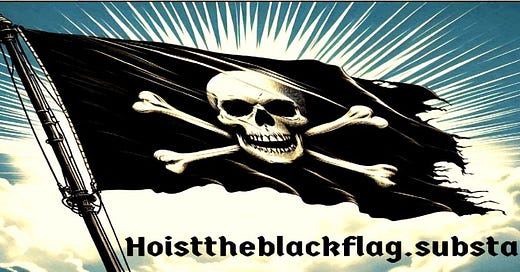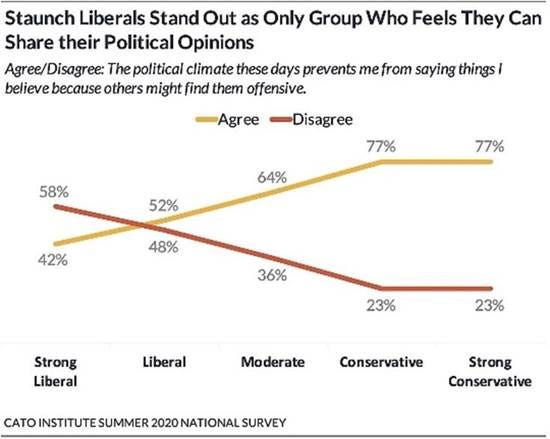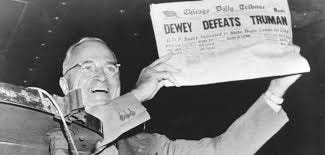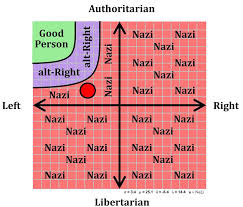I honestly never thought of myself as a conservative. Still don’t really. Yes, I have some conservative beliefs but as far as I can remember these developed later in life. Perhaps the old saying is true, “If you aren’t a liberal when you’re young you have no heart and if you’re not a conservative when you’re old you have no brain.” Not long ago, when I engaged in political debates with a conservative American friend of mine, I would more often than not take the liberal position on most topics. I distinctly remember stating “sure there’s some abuse of the welfare system, but isn’t it better that we help those in need?” This brings to mind another quote, “to be old and wise, one must first be young and stupid.” I was in my 40s at the time so perhaps “young” isn’t necessary.
It's tempting sometimes to look at this meme and think, “I didn’t change, the world did.”
That’s not entirely true though. Yes, the center did shift. Historical guilt, crime, trans, DEI, and a host of other far left policies did shift politics to the left, but my life experiences (I hate that phrase) contributed to me shifting (a little) to the right as well. How did I end up on the right? To paraphrase Hemingway, it happened slowly and then all at once.
My origin story:
Like superheroes we all have origin stories - Behold! “Mr. Fed up!” “Annoyed-Man?” “Dr. Strange(opinions)?” Ok, I need a better name for my alter ego. Hopefully something better than “Tariff Man.” Unlike superheroes I can’t trace my transformation back to a single incident, but I do remember the major ones and they were, starting a business, going back to school for my master’s, and the 2016 election.
They’re going to pay us for what?
Let’s start with a disclaimer, the conclusions I reached are based on personal experience. It’s anecdotal, and as they say, “anecdote isn’t evidence.” That said I have enough anecdotes for it to at least count as circumstantial evidence.
Starting a business was…illuminating. It was what first made me start to question many of my assumptions about people, the causes of poverty, and the effectiveness of government.
In 2015 my partner and I started a business renting apartments and storage spaces in upstate New York. If I had to categorize our customers, I would say they were mostly blue collar and lower middle class. There is an assumption on the left that if you’re poor it’s due to unfortunate circumstances and while I would agree that luck can play a role, what many on the left refuse to believe is that sometimes personal choices play a part as well. I witnessed poor spending habits – “I have a $50k truck and 4 dogs, and for some reason can’t pay my rent. Can you carry me for a few months?” – a disregard for other people’s property – “it’s not mine so why not break it?” - and penchant for losing one’s job because of conflicts with employers, theft, and absences, and that’s before we get into the surprisingly common excuse that “I can’t pay my rent because I’m in jail.”
The government’s response was also enlightening. In New York State a tenant cannot be evicted without a hearing and if they skip the hearing or miss it because, for example they’re in jail, that’s the landlord’s problem; the hearing will be postponed one or more months, and the tenant will go on living rent free.
Out of work and don’t want to sell your boat (yes boat)? No problem, the government will pay to have it stored. Yes, we took the money. If we didn’t someone else would have.
This situation became worse during the pandemic when the government increased unemployment payments and instituted an eviction moratorium. If anyone asks you how many people will quit their jobs and stop paying rent in that type of situation you can tell them it’s about 40%.
Going into the business I believed everyone was honest, hardworking, and genuinely good. 10 years later I would change “everyone” in the previous sentence to “most people.” There are days when “most” seems generous.
Irving Kristol once said, “a neoconservative is a liberal who got mugged by reality.” I guess that’s as good a description as any for what happened to me.
But my journey wasn’t complete. Surely universities will restore my faith in humanity…
The Boy in the Bubble:
The business actually did pretty well for a while (until COVID hit and the government put its thumb on the scales). Well enough that when I had the opportunity to quit my job and pursue a master’s in history, I jumped at it.
I’ll be honest, it was a little scary going back to school in my 40s. Especially given that I took engineering as an undergrad and was pursuing a post-grad degree in US history. However, after the first couple of courses I realized I could keep up and that I had something that my fellow students, and most of the professors, didn’t have, real world experience. However, I was still entered the program operating under a couple of false assumptions:
1. Grad school isn’t a progressive bubble
2. Academia is the pursuit of truth
Prior to entering the program, I recall reading stories arguing that universities were progressive bubbles, but I largely discounted them. I obtained my undergrad at a military college, The Royal Military College of Canada, so perhaps my belief that university was the same as the real world were colored by that. In any case, reality took some time to set in.
Some of it was just childish nonsense like allowing students to bring pets to class up to and including “emotional support ponies.” No, I never saw one, but we were told they were permitted.
Putting aside the 1619 project that was published shortly before I left, four incidents occurred that convinced me that, yes, universities are progressive bubbles:
1. “Undocumented” not “illegal” – I thought they were playing a joke on the old guy. “You can’t say ‘illegal.’” “What? Why not? What am I supposed to call them?” “It’s offensive and dehumanizing. You have to say ‘undocumented.’” Looks around, “you’re kidding, right?” Head shakes all around. As someone who was in the country on a visa, I found support for “jumping the queue” appalling. I can’t be sure how many other people felt the way I did because…
2. “If they have something to say they should just speak up” – The only students who ever approached me after a class to say they were uncomfortable voicing their opinions were the conservatives. The school fell over itself ensuring that women and minorities were comfortable but the one time I mentioned that conservative students were reluctant to speak I was told “they should just speak up.” How surprised should I have been that the only people who would be ridiculed or shamed for their opinions were in the only group that academics didn’t care about?
3. Don’t penalize students for poor English – I’m sorry, I meant stop engaging in “linguicism!” If your first thought is “you made the up,” let me assure you that I didn’t. Human-rights activist and linguist Tove Skutnabb-Kangas did. If you think students should be held to a certain English standard or that you shouldn’t go to an American school if you can’t speak the language well enough not only, are you wrong, but you’re probably a racist as well. I would never apply to a school in Paris if I didn’t speak French but apparently my way of thinking is outdated.
4. Slavery is bad because… - One of the requirements of a PhD in US history is to write a thesis. Not just any thesis, but one that presents an idea that has not been explored before. Or at the very least, explore different aspects of it or come to a different conclusion. One day a question occurred to me, has anyone ever done a calorific analysis of slaves vs poor whites? Is it possible that, from a health standpoint, the poorest whites had it worse than the most well treated slaves? So, I asked my officemate if he knew of one. He did not. What’s more, he stated that if one existed “we’d have to cover it up so that Republicans didn’t find out about it.” I shook my head but by this time I knew better than to argue. I next went to one of the Profs and received an answer along the lines of “slavery is always worse.” Why? “Because you’re not free.” Fair enough but being free to starve to death in a gutter because you were crippled in a factory accident and can no longer pay for food doesn’t sound that great to me either. Isn’t it possible that being the most well-off slave is better than being the worst-off poor person? I didn’t bother to ask because I’d learned what I needed to know; there are some questions you’re not allowed to ask.
As you can see, not everything I learned in grad school had to do with American history. Which brings me to…
Those racist sure are stoopid!
I remember my disdain for Trump in the lead up to the election. I was all in on “he’ll never win” and he’s colluding with the Russians. I didn’t have a high opinion of Hillary, but I thought she’d be OK. I remember leaving work the day of the election and smiling at a coworker who confidently told me Trump would win. “You poor deluded fool” I thought. Needless to say, I was shocked when he won. I turned the TV off at about 9:30 when it was clear he was going to win and went to bed thinking the stock market would crash the next day. It didn’t. It rose significantly as the week progressed and a liberal friend and I concluded “we have no idea what we’re talking about.” Doubt is the seed of wisdom. If no one has said that before, I’m claiming it.
I was still in grad school at the time and in the lead up to Hillary’s inevitable victory the school had scheduled a talk in preparation of the historical election of America’s first female president. After she failed to win, I remember thinking “it’s still historic” so I attended. I was not prepared for what took place.
While students protested outside (“did they even bother to vote?” I wondered) the panel proceeded to inform the assembled faculty and students that Hillary lost due to racism and sexism. Once I picked my jaw up off the floor it occurred to me that racism and sexism are always blamed when the Democrats lose. It didn’t even make any logical sense. So, the racists didn’t bother to vote in 2008 and 2012 when there was a black candidate but as soon as there were two white candidates they came out in force? I gave little credence to the sexism argument knowing full well that she made numerous errors leading up to the election. She was the Thomas E. Dewey of the 21st Century.
Once again, my illusions were shattered. Not only were academics not pursuing truth, but they were also blinded by ideology. I had an epiphany. If they always came to the wrong conclusion for their election defeats, what else could they be wrong about? Some would argue that I was “red-pilled,” that I suddenly became aware of the political biases of the media and faculty. Whatever you chose to call it, I no longer viewed the world as black and white.
How did I get into writing?
They say 50% of people fail to complete their postgraduate studies. I am officially in that group. I didn’t fail out, I’m ABD, “all but dissertation,” I was simply undone by circumstances. COVID hit, the archives shutdown, and I moved back to Canada all of which made research much more difficult. My choice of thesis topic also didn’t help. I chose “Mass Incarceration” before realizing the extent of academia's ideological capture. If you’re going to argue, as I was, that the rise in incarceration rates wasn’t due primarily to racism, the best you can hope for is a long slow slog where everything you suggest is questioned. At worst you’re just an old racist – “How can you possibly suggest that the black incarceration rate is tide to criminality?” Because the data says so?
Don’t get me wrong, I enjoyed my time in post-grad, and I honestly can’t think of one person I didn’t like. I just came to the conclusion that most of them were incapable of accounting for their biases when analyzing history. If I’m being completely honest, I also lost interest. I had done enough research to know what happened and the work necessary to put “Dr.” before my name just didn’t seem worth the effort and so I called it quits. I still think it was time well spent. I earned a masters, learned quite a lot about American history and how academia functions, and, most importantly, became a much better writer.
How did I go from there to writing a Substack? You can thank Queen Elizabeth II for that. Well, not her exactly, more this response to her death:
That doesn’t appear too offensive until you find out she deleted a tweet that said "heard the chief monarch of a thieving raping genocidal empire is finally dying. May her pain be excruciating."
Care to guess what she does for a living? Correct, she’s an academic. She’s also an “anti-racist” and feminist. It’s the trifecta of left-wing lunacy.
I had had enough. I could no longer bite my tongue. I wrote something up in about 30 minutes and posted it on Facebook (I didn’t have a blog at the time). My article earned me this:
No great loss. My interest in “applied linguistics, critical sociolinguistics and critical discourse studies primarily examining race, gender, sexual, and social class identities in new language learning through the experiences of African American students” is limited. To say the least.
I wish I could say that I was courageous but the fact that I write under a pseudonym proves otherwise. Yes, it’s not that hard to figure out who I am but it took some time before I was willing to put any personal information out there.
Anyway, after that post, I was off and running.
Conclusion
As Trump takes office and takes a sledgehammer to domestic and international norms my political concerns have begun to shift. No longer do I worry the center will keep moving left. Today I worry that the pendulum will swing too far to the right and take us into over-correction territory. I worry that those who believe that there’s no good person to their right will find themselves competing with those who think there’s no good person to their left. I have argued for too long for nuance and moderation to happily watch politics taken over by people who think “whatever Trump wants.”
When I lived in upstate New York most of my coworkers considered me a liberal while the students and faculty at the college considered me a conservative. This will happen when you move between bubbles. The truth is I am both and neither. I judge policies based on knowledge and experience not on what “my team” wants. I have spent the last two years building an audience while fighting left wing overreach. As a result, many have labelled me a conservative. With Trump in the office I expect to lose some of my subscribers as I fight his excesses. I wouldn’t be surprised if many begin to call me a liberal. The next few years look to be bumpy.
Why not come along for the ride?
Phil (Hoisttheblackflag) is a writer and classical liberal who, when not complaining about the Ottawa Senators, writes about politics, individual rights, government corruption/abuse and free speech. He resides in Vancouver, British Columbia.
You can read more of his work at















